The No. 1 Thing You Shouldn’t Be Doing With Your Skin After 50
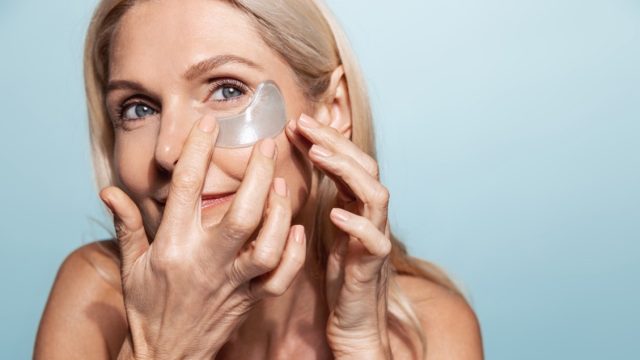
While you may not care about the numerical aspect of getting older (age is just a number after all), it might not be as easy to accept the changes you’re going through emotionally and physically. When it comes to the latter, the most noticeable changes are likely to show on your skin. Once you pass the 50-year milestone, you may start noticing wrinkles and fine lines, darker eye circles, and dry patches. Luckily, there are plenty of ways to keep your skin looking youthful.
To achieve fresh and healthy skin, it might be time to consider switching up your beauty routine, either by adding certain products or omitting some of your common habits. To learn where you’re likely going wrong, we turned to dermatologists and plastic surgeons to determine the number one thing you shouldn’t be doing with your skin after 50. Read on for their expert advice.
READ THIS NEXT: If You’re Over 50, Sleeping in This Position Is Aging You, Experts Warn.
Your skin needs more attention as you age.
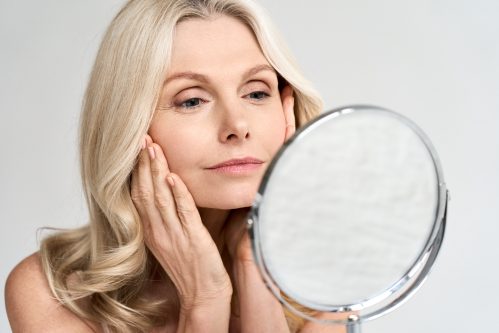
As you age, the skin tends to dry out more rapidly and become more vulnerable to bacteria and unwanted build-up—and simply cleansing won’t do the trick.
According to Mark Tager, MD, author of Feed Your Skin Right, and CEO of ChangeWell, some of the skincare areas you’ll need to pay more attention to include retaining moisture, creating more rapid skin turnover, and protecting the skin from UV and other harmful environmental factors. “Using topicals with bioactive ingredients to penetrate the dermis and stimulate the production of collagen and elastin is key,” he says.
In terms of moisturizing, look for products “with a mix of emollients, occlusive, and humectants,” advises Corey L. Hartman, MD, founder of Skin Wellness Dermatology. He explains that emollients add moisture to the skin barrier, while occlusives add moisture in addition to creating a physical barrier that prevents transepidermal water loss, which locks in hydration. The humectants help by attracting water from the air or deeper into the skin. Hartman also points out that drinking plenty of water is a key way to hydrate your skin.
For more beauty advice delivered straight to your inbox, sign up for our daily newsletter.
This is the number one thing you shouldn’t do with your skin after 50.
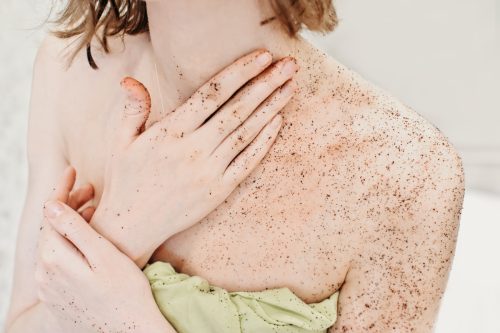
Exfoliation can help remove dead skin cells and extra buildup, but too much scrubbing can ultimately cause harsh repercussions to any skin type no matter your age.
Dendy Engelman, MD, board-certified cosmetic dermatologist and Mohs surgeon, explains that your skin takes longer to heal when you’re older, so you’re more likely to sustain damage from over-exfoliation, especially since the skin is more prone to bouts of dryness. “Instead, treat your skin gently and remove dead skin cell buildup with toners (like Humphreys Witch Hazel Toner) and gentle chemical exfoliants,” she recommends.
If you feel that your skin can handle a gentle exfoliation, Hartman suggests using a lighter product such as Dial Himalayan Salt Body Wash, which has gentle exfoliators that create smooth skin without causing irritation. But, if you’re over 50, do steer clear of any harsh products or over-exfoliation techniques.
Don’t rely solely on your dermatologist or treatments.
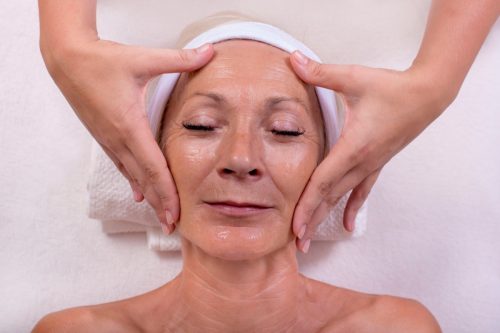
It’s a given that you should be seeing your doctor or dermatologist regularly, yet they can’t be solely responsible for keeping your skin healthy. Relying on office treatments, procedures, or devices to maintain that youthful look and boost skin health is not the help you think it is.
“While treatments like lasers, peels, injections, and more are excellent (and recommended!) supplements to your skincare regimen, they do not replace a good daily routine that incorporates cleansing, nourishing, and protecting the skin,” says Engelman.
The pros are there to guide you, but ultimately you have to be the one caring for your skin each day. If you have questions, talk to your dermatologist about your specific skincare needs.
READ THIS NEXT: Goldie Hawn Swears by This Grocery Store Product for Perfect Skin at 76.
Continue to protect your skin from the sun.
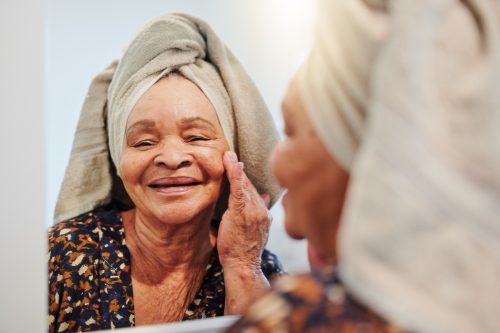
Adjusting your skincare routine doesn’t mean you can stop worrying about sun damage. Choosing moisturizers and makeup with SPF is a must. And don’t forget to protect other parts of your body that are exposed, in addition to your face.
According to Hartman, wearing sunscreen daily will help halt harm from the sun, since it “can help reverse signs of previous sun damage, as it protects skin from new damage and gives skin the opportunity to work to heal itself, versus constantly fighting off new sun stress,” he says.
If you do get a bit too much sun, follow up the exposure with aloe (either on its own or in a moisturizer). “Aloe contains active compounds that may reduce pain and inflammation and stimulate skin growth and repair,” explains the Icahn School of Medicine at Mount Sinai. “It is also an effective moisturizing agent.”
Don’t neglect what your body needs.

Your skin is an organ, and that means it’s affected by the overall health of your body. First, a good night’s sleep is key. “Sleep is so critical to beautiful skin because it is when the ‘nighttime gardeners’ get rid of the dead cells in the skin, remove the products of metabolism that have accumulated, and start the process of skin regeneration,” says Tager.
Knowing and understanding your hormone levels, food sensitivities, and blood values is also key information to have handy when you’re over 50. “I am shocked at how many people don’t know their vitamin D level… a key hormone for skin, bone, and immune health,” adds Tager. And, of course, a healthy diet is also a must.